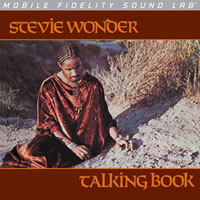Stevie Wonder • Music of My Mind
Stevie Wonder • Talking Book
oth Music of My Mind and Talking Book were released in 1972, when Stevie Wonder was just 21 years old, and they mark the beginning of his most artistically significant period. In the early '70s, his contract with the Motown label was coming to an end; unwilling to lose their star, Motown agreed to give him complete artistic control over his albums. What followed was a series of four albums -- the two reviewed here, Innervisions and Fulfillingness’ First Finale -- that remain vital and significant 40 years after their release. The songwriting on these albums displays a maturity beyond Wonder's years (the only weakness is some too-sweet lyrics) and includes early examples of extensive use of Moog and Arp synthesizers in pop music. Wonder’s deft use of these within traditional song structures and alongside traditional instruments remains masterly and something from which many contemporary artists could learn. He compounded the artistic achievement of these albums by playing nearly everything himself, with only occasional guest musicians. Music on My Mind was released six months earlier than Talking Book and displays a more raw, rock'n'roll side than the later album. Opening with the 15-minute one-two punch of "Love Having You Around" and "Superwoman," the album covers themes of love only to end with a philosophical inquiry about "Evil" (a sign of Wonder’s awareness of the politics of the time, perhaps). The music is often loose but confident in a way similar that of great jazz jam sessions. Songs are given time to breathe and develop, with only three of the nine songs coming in at a radio-friendly time of less than four minutes. Talking Book is more soul-pop, lacking the rawness of Music of My Mind. Side one begins with the well-known "You are the Sunshine of My Life" and proceeds to move back and forth between songs of love and betrayal. Side two continues these themes in many of the songs, but also includes "Big Brother," a protest song that may be even more catchy than it is biting. The songwriting hooks on both albums can easily get stuck in listeners’ heads, but I doubt they will mind such enduring mental reminders. These LPs come from Mobile Fidelity’s Silver Label. They are pressed on regular-weight vinyl, but the mastering process is the same Gain 2 Analog System as used for the heavier, more expensive releases. While the vinyl may be in a lighter weight class, the sound delivers a heavyweight punch. The pressings are dead quiet, and the overall presentation is liquidly smooth and appears against a pure black background. Voices and instruments inhabit their own spaces both in width and depth, providing an expansive soundstage. I’ve been seduced by the sound nearly as much as the music each time I’ve played these records, which has been almost daily for weeks. The beauty of the sound is complemented by the heavy gatefold sleeves that make for a package well worth the cost. Fulfillingness’ First Finale is on Mobile
Fidelity's schedule, but licensing issues must prevent Innervisions from being part
of the series, and that is truly a shame. At the moment the only audiophile vinyl version
of that album appears to be a Japanese reissue that will cost a third again as much as
these two MoFi LPs combined. |


